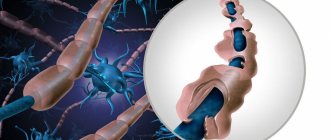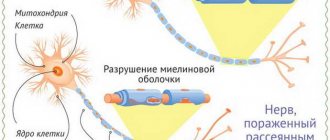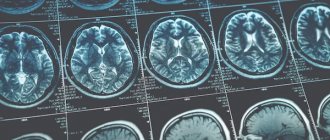Human nerves are built just like electrical wires. Just like any cable, the nerve has its own insulation - it is called the myelin sheath. Only its functions are slightly different. While conventional insulation is primarily needed to ensure that no one gets electrocuted, myelin plays an important role in the normal functioning of the nerve.
Our expert in this field:
Lashch Natalia Yurievna
Neurologist of the highest category, candidate of medical sciences, associate professor. Laureate of the Moscow City Prize in the field of medicine.
Call the doctor Reviews about the doctor
Multiple sclerosis (MS) is a disease in which the myelin sheath is destroyed. This leads to neurological disorders that worsen over time.
What are the possible consequences of multiple sclerosis in men and women?
The disease has a chronic course. The prognosis and possible consequences depend on the gender, age of the patient, the course of MS, and what the symptoms were at the onset of the disease. On average, sick people live 5-10 years less than healthy people. Almost half live to age 60 or older.
Over time, serious complications may arise:
- convulsions, fits, as in epilepsy;
- muscle stiffness;
- paralysis, usually in the leg muscles;
- severe memory impairment;
- mood swings;
- urinary and stool incontinence;
- depression.
Multiple sclerosis is a serious disease and requires individually tailored treatment. The patient should be regularly monitored by a neurologist.
Treatment of multiple sclerosis in Moscow at the international clinic Medica24
During an exacerbation of the disease, corticosteroids are used - preparations of the adrenal cortex. They suppress immune reactions and inflammation. If the symptoms are very severe and medications do not help cope with them, they resort to plasmapheresis, a blood purification procedure.
To prevent attacks and slow down the progression of the disease, special drugs are used that change the course of multiple sclerosis - DMTs. They began to be widely used at the end of the 20th century. Treatment of PED is a rather complex process. The doctor must have the appropriate competence, be able to select the right combination of drugs, and guide the patient on them. Today in Moscow there are multiple sclerosis treatment centers that deal with this area of therapy.
Treatment of multiple sclerosis (MSD) should begin as early as possible, after the diagnosis is established - in this case, the best effect can be achieved. But even if the patient’s condition has deteriorated significantly, this is not a reason to give up. Contact a specialist.
At the Neurology Center of the International Clinic Medica24 you can get a consultation with an experienced neurologist. Call +7 to make an appointment with a doctor on a weekday or weekend.
Depending on which nerve fibers are affected, the manifestations of multiple sclerosis may vary. In addition, the course of the disease varies. As a rule, the first symptoms begin to bother you at the age of 20-40. Women get sick more often than men.
Types and stages
Multiple sclerosis is divided into forms depending on the nature of the disease:
- remitting: exacerbations occur rarely, during the period of remission, brain functions are fully or partially restored;
- primary progressive: the disease begins gradually, the intensity of symptoms slowly increases, and functional recovery does not occur;
- secondary progressive: the patient notes rare exacerbations, between which the symptoms continue to slowly progress;
- progressive-remitting: at first the disease has a similar course to the relapsing-remitting form, but then becomes a stable progressive course.
The severity of symptoms allows us to distinguish the following stages of multiple sclerosis:
- acute: the first two weeks from the sudden onset of symptoms;
- subacute: includes the first two months from the onset of exacerbation;
- Stabilization stage: no exacerbations for 3 months or more.
Pulse therapy
In cases of exacerbation of symptoms of multiple sclerosis or the appearance of new symptoms, pulse therapy is used - intravenous administration of loading doses of a hormonal drug.
The best results are shown by the administration of 6-methylprednisolone. This drug has powerful anti-inflammatory, anti-edematous and immunomodulatory effects.
The hormonal agent is administered intravenously through a dropper. The duration of the course is from 3 to 7 days. Pulse therapy at the international clinic Medica24 is carried out according to protocols that have proven their effectiveness based on the results of clinical randomized studies, taking into account the individual characteristics of the patient.
Indications for pulse therapy are symptoms of damage to the brain stem, cerebellum, and spinal cord. The goal of treatment is to relieve acute symptoms, improve the condition and slow down the development of multiple sclerosis.
The decision to conduct pulse therapy at the Medica24 international clinic is made on the basis of MRI data (with a contrast agent), in the presence of active foci of demyelination, the appearance of new foci or the growth of old ones. MRI data must be confirmed by changes in the clinical picture of the disease.
As a result of pulse therapy for multiple sclerosis at the international clinic Medica24, a significant improvement in the condition is achieved - dizziness, unsteadiness of gait, numbness and weakness of the arms and legs disappear, and vision improves.
The development of the disease slows down, regression of symptoms and even achievement of remission is possible.
On the other hand, the use of loading doses of a corticosteroid may lead to side effects. Some of them are minor - insomnia, slight euphoria or anxiety, nausea, hiccups, headache, increased appetite. Others are more dangerous - cardiac arrhythmia, hyperglycemia, sudden fluctuations in blood pressure, bleeding.
Therefore, a course of pulse therapy for multiple sclerosis is best carried out in a hospital setting, where the patient is under constant medical supervision. This allows you to adjust the treatment course in time and eliminate side effects.
The international clinic Medica24 has extensive experience in treating multiple sclerosis with loading doses of glucocorticoids, achieving maximum results with minimal side effects and timely correction of the patient’s condition.
Take care of yourself, book a consultation now
Message sent!
expect a call, we will contact you shortly
Discussion
The need and possibility of correcting cellular energy deficiency in inhibiting neurodegeneration in MS
The most promising from the point of view of inhibiting neurodegeneration are considered therapeutic strategies aimed at improving metabolism, in particular ensuring a sufficient supply of energy, neurons and glial cells. Adenosine triphosphate (ATP), as the main source of energy, is necessary in the central nervous system (CNS) to maintain membrane potential, synapse function, and the functioning of neurons and glial cells. The bulk of energy reserves is spent on maintaining the membrane potential of Na+/K+ ATPases [11], which can be disrupted due to inflammation and demyelination [12]. Insufficient energy production or excess energy consumption leads to hypoxia, which can cause neuronal and axonal dysfunction and degeneration [4]. The emergence of metabolic drugs with proven clinical effects in MS allows us to be optimistic about the prospects for this new direction in the treatment of MS.
Biotin is the first in a series of such metabolic drugs. Long-term high-dose biotin reduced EDSS disability and/or improved walking distance of 25 feet in 12.6% of patients with progressive MS [5], although these results require further confirmation and refinement. The metabolic mechanism of action of biotin is manifested primarily in the fact that the drug enhances the synthesis of fatty acids by increasing the activity of carboxylases, which stimulates energy production in neurons, thereby reducing hypoxia and promoting remyelination [13].
Another important metabolic therapeutic agent that has predominantly immunomodulatory and anti-inflammatory effects in MS is vitamin D [6]. Its effects have been studied in a number of clinical studies, mainly in RMS and clinically isolated syndrome; it is also planned in patients with progressive MS [14], especially in terms of the effect on remyelination and inhibition of CNS damage. It has been established that vitamin D deficiency correlates with an increased risk of developing MS, and its level may be inversely related to the activity and progression of RRMS [15].
Thus, metabolic therapy is now increasingly not only considered as a promising direction in the treatment of MS, but also receives objective confirmation of this.
Metabolic effects of cytoflavin
One of the metabolic drugs that has been used for many years in practical healthcare for various diseases accompanied by energy deficiency is cytoflavin. The drug consists of four active metabolic components (succinic acid, riboxin, riboflavin, nicotinamide) that can influence the functioning of the Krebs cycle of mitochondria, which is accompanied by an increase in the production of high-energy compounds, in particular ATP. The components of cytoflavin simultaneously act on various parts of the Krebs cycle, which causes an antihypoxic and antioxidant effect, activates the intracellular synthesis of protein and nucleic acids, promotes the utilization of glucose, the synthesis and intracellular accumulation of ATP. Each of these components of cytoflavin individually is widely used in clinical practice for various forms of pathology. Using them together in combination can provide additional synergistic (additive) metabolic effects under ischemic conditions.
Thus, it has been established that riboxin (inosine, a purine nucleoside) is a precursor of ATP and realizes its metabolic effects on the myocardium, being an agonist of purinergic receptors, with the participation of which activation of glycolysis occurs - the most important process for maintaining the energy pool in the myocardium under hypoxic conditions. In animal studies, inosine not only improved memory and learning in rats, but also had a strong antioxidant effect and increased the survival of hippocampal neurons [16].
The next component, riboflavin mononucleotide, provides high activity of a number of enzymes involved in antioxidant protection and maintaining normal glutathione levels. In addition, riboflavin plays a critical role as a coenzyme for succinate dehydrogenase in complex II of the mitochondrial respiratory chain, which generates intracellular ATP [17].
Nicotinamide, being a precursor of dehydrogenase coenzymes (NAD+ and NADP+), has antihypoxic properties [18]. In addition, nicotinamide inhibits the development of an experimental model of MS, autoimmune encephalomyelitis, by blocking T-cell differentiation [19] and has a neuroprotective effect on axons in autoimmune encephalomyelitis [20].
The fourth component of cytoflavin, succinic acid, is an intracellular metabolite that acts as a substrate for oxidative phosphorylation in the mitochondrial cycle of tricarboxylic acids, improves tissue respiration by enhancing electron transport in mitochondria and thereby enhances the energy supply of the cell [21], reduces the concentration of lactate, pyruvate and citrate, which increase during hypoxia. Oxidized by succinate dehydrogenase, succinic acid in the respiratory chain ensures rapid resynthesis of ATP by cells [22] and, more pronounced than other Krebs cycle substrates, increases the amount of reduced mitochondrial nicotinamide dinucleotides (NAD+) [23]. Administration of succinic acid in some experimental models of neurodegenerative diseases leads to a rapid decrease in mitochondrial dysfunction and a decrease in neurological defect [24].
Among other drugs with metabolic effects, pentoxifylline should be noted. In addition to the well-known antiplatelet drug, this drug also has an anti-inflammatory effect, which is probably due to inhibition of the production of the important pro-inflammatory cytokine TNFa by macrophages [25]. Pentoxifylline showed in studies on a model of MS autoimmune encephalomyelitis in rats a significant reduction in symptoms of the disease and a decrease in inflammation in the brain, according to histological studies, compared with the control. However, in a clinical study for RMS, the effectiveness of pentoxifylline was not confirmed [26]. Nevertheless, the known antiplatelet and potential metabolic properties, along with the availability of the drug, ensure its widespread use in clinical practice.
Thus, metabolic therapy for MS may have as its goal both the correction of energy deficiency and hypoxia, as well as immunomodulatory, anti-inflammatory and antiplatelet effects, which allows us to consider this therapy as an important, separate, additional direction in the treatment of MS, capable in a number of aspects (safety, availability, inhibition of progression) to compete with PMTRS.
The most common symptoms of multiple sclerosis in women and men
The severity of manifestations of multiple sclerosis varies. Most people experience the following:
- Unusual sensations in different areas of the body. This may be numbness, unpleasant tingling (“like needles”), burning, itching. Similar signs occur in approximately 50% of patients.
- Bladder disorders. Occurs in approximately 80% of patients. Often has the urge to go to the toilet, including at night, and is bothered by the feeling as if the bladder is not completely emptied.
- Intestinal disorders. Manifests itself in the form of constipation.
- Walking disorder. The disease is often accompanied by weakness and muscle cramps, along with numbness in the legs, dizziness, and problems maintaining balance. This makes it difficult to walk.
- Dizziness.
- Constant fatigue. It is especially disturbing in the afternoon, even if the person had rested all day before. The patient may feel tired even after sleep. This manifests itself in the form of difficulty inhibited thinking, muscle weakness, and drowsiness. This condition occurs in approximately 80% of patients.
- Muscle spasms. Occur in approximately 40% of cases, usually affecting the leg muscles. Feelings range from tension, stiffness to painful spasms.
- Problems with thinking. About 50% of patients are bothered by symptoms such as slow thinking, memory impairment, and decreased concentration.
- Speech disorders. The patient may speak through his nose, slurred, and take long breaks between words.
- Swallowing disorders. Occurs in the later stages of the disease.
- Problems in the intimate sphere. Signs of multiple sclerosis in women may include vaginal dryness, and in men - weakening of erections.
Fortunately, many symptoms of multiple sclerosis have effective treatments and can be kept under control. To do this, you need to constantly be under the supervision of a neurologist and conscientiously follow all prescriptions and recommendations.
If symptoms from this list appear, especially if they continue for a long time, you should immediately contact an experienced neurologist. It may not be multiple sclerosis, but there is always a risk, and if the diagnosis is confirmed, it is better to start treatment immediately.
Causes of multiple sclerosis in men and women: factors that increase risks
There is no clear reason why some people develop the disease and others do not. However, there are some known risk factors that increase the likelihood of developing multiple sclerosis:
- Female. For unknown reasons, women get sick twice as often as men.
- Age. The first signs of the disease usually appear at the age of 15-60 years (most often at 20-40 years).
- Some infections. For example, it is known that the risks are increased by infectious mononucleosis, a disease caused by the Epstein-Barr virus.
- Having sick relatives. You are at greater risk if one of your parents or siblings has already been diagnosed with multiple sclerosis.
- Ethnicity. The disease is most common among the indigenous people of Northern Europe. Asians, Africans and American Indians have the lowest risks.
- Some diseases. The risk is increased by certain thyroid diseases, inflammatory pathologies in the intestines, and type I diabetes.
- Smoking. Smokers develop MS more often than non-smokers.
If you or your relative experience the first suspicious symptoms, immediately contact an experienced neurologist.
Multiple sclerosis: causes of disease symptoms
Sometimes there are three groups of manifestations of multiple sclerosis, each of which is caused by certain reasons:
- Initial disorders are associated with damage by the immune system to the sheaths of nerve fibers. As a result, the passage of nerve impulses is disrupted, and corresponding neurological disorders occur.
- In turn, this leads to disruption of the functioning of internal organs and the development of secondary disorders. For example, if the bladder stops functioning normally, the risk of genitourinary tract infections increases.
- All this cannot but affect the quality of life, performance, and social adaptation of a person. The resulting disorders lead to psychological problems.
Treatment should target all of these causative factors in multiple sclerosis. It is necessary to keep the main symptoms of the disease under control, combat complications from internal organs and carry out rehabilitation treatment, and strive to ensure that the sick person lives as full a life as possible.
Since the causes of the disease in multiple sclerosis are not fully known, there are no effective methods of prevention. It is extremely important to notice the first symptoms in time and immediately consult a doctor. If you need a consultation with a neurologist, you can make an appointment with a specialist at the international clinic of modern neurology Medica24 around the clock. Just call.
Get a correspondence consultation with a neurologist
Message sent!
expect a call, we will contact you shortly
An appointment with a doctor begins with a conversation. The neurologist needs to figure out what symptoms bother the patient, when and how they arise, what provokes them, whether there are exacerbations, and how the condition changes over time. A neurological examination is then performed.
It is important that the neurologist carefully evaluates the patient’s condition and excludes all other possible diseases.
In a relapsing-remitting course, when the disease periodically goes through stages of exacerbation and improvement, the diagnosis is relatively easy to establish based on the clinical picture of multiple sclerosis and MRI data. If the patient is concerned about unusual symptoms or the disease is constantly progressing, other tests may be needed.
Diagnostics
As a result of the constant alternation of exacerbations and remissions, the diagnosis of multiple sclerosis can be difficult and take a long time. To confirm the disease, a set of studies is used, which helps to assess the state of the nervous system and the nature of the spread of the pathological process.
At the first stage, the patient is interviewed, identifying his complaints, general health and the onset of the disease. Additionally, a series of instrumental studies are prescribed to create a clear picture of multiple sclerosis. Among them are used:
- CT and MRI.
- Inspection of potentials.
- Laboratory methods, in particular the study of cerebrospinal fluid and blood.
Based on such data, differential diagnosis is carried out, since the disease, in its symptoms and nature of the course, is similar to many conditions.
What studies and tests help diagnose multiple sclerosis?
For diagnostic purposes, the doctor may prescribe the following tests:
- Blood tests. Helps rule out other diseases. There are no specific substances that would indicate multiple sclerosis; scientists are currently busy developing such diagnostic tests.
- Spinal tap. Between two vertebrae in the lower back, a needle is inserted into the space around the spinal cord and a small amount of cerebrospinal fluid is obtained for analysis. It detects antibodies associated with MS, which also helps rule out other diseases.
- MRI. The test reveals damaged areas in the brain and spinal cord. MRI with contrast is sometimes used.
- Evoked potential method. During the study, a special device records electrical signals that arise in the nervous system in response to stimuli.
Under no circumstances should you engage in self-diagnosis. Visit a neurologist.
Exercise stress
Physical activity will help you cope with the symptoms of the disease, but in order to ensure the safety of your training program, you must follow a number of precautions:
The most important thing to remember is don't overdo it. Excessive load can disrupt the functioning of your muscles and create a state of stress for the nervous system.
Before starting your next training program, discuss the following with your doctor:
What types of physical activity are best for you, what types of activities are best to avoid.
What is the permissible intensity of physical activity?
What is the duration of the load and are there any restrictions.
Before starting a training program, seek the advice of a medical specialist who can ask any questions you may have.
Is there a way to prevent multiple sclerosis?
Scientists do not fully know the causes of the disease, so there is no effective prevention of multiple sclerosis. But you can minimize the risks of many neurological, and not only, diseases if you lead a healthy lifestyle, eat well, treat any diseases and infections in a timely manner, stop smoking and minimize alcohol consumption.
If any disorders of the nervous system occur, it is better to immediately contact the neurological center and consult a doctor. If you need a consultation with a neurologist, make an appointment with a specialist right now by calling +7. We can also provide diagnostics.
The material was prepared by Natalya Yurievna, a neurologist at the international clinic Medica24, Candidate of Medical Sciences Lasch.
Fever
Avoid exposure to heat. At high ambient temperatures, the functioning of the nerves and brain can be disrupted, which will intensify existing neurological disorders. It is recommended not to be in the open sun, in a hot room, not to visit a bathhouse or sauna, or to take a hot shower. To create a comfortable environment, use air conditioning (at home, in a car, when calling a taxi, indicate this need). If you are unable to avoid the effects of elevated temperature, remember that the increase in symptoms is temporary and there is no permanent damage to your nervous system.







